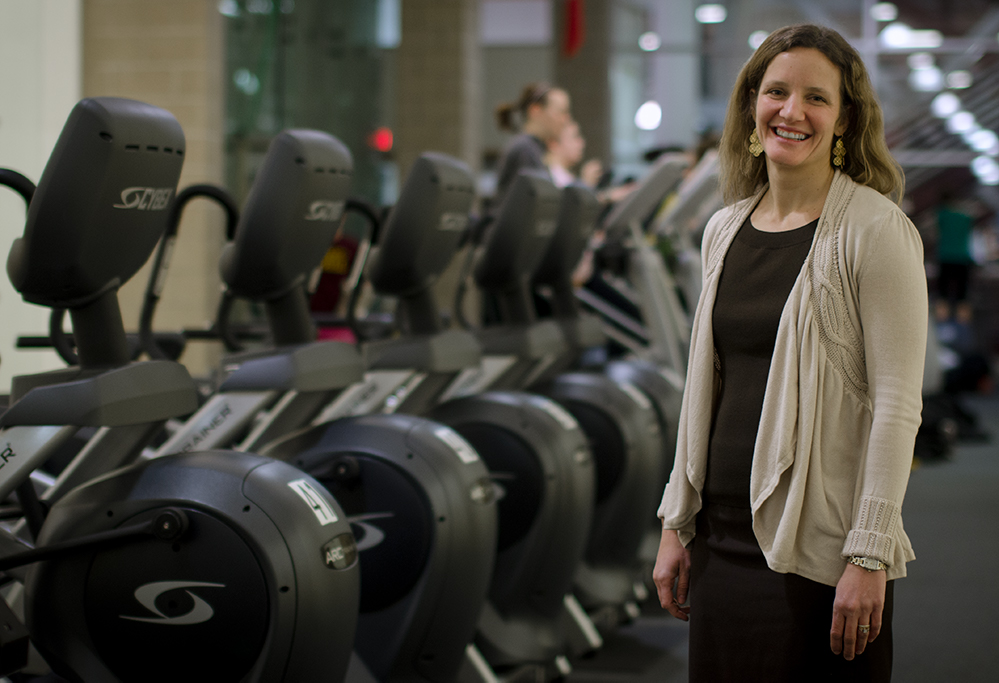In 1999, Beth Lewis made a New Year’s resolution: Exercise five times a week.
Lewis had been active in sports and physical activity all her life, but the stresses and demands of graduate school left her little time or energy for a regular exercise routine. Yet when she did exercise, she realized how good she felt—and how much better she was at coping with the pressures of school and life.
Fourteen years later, Lewis is still working out at least five times a week. And that New Year’s resolution sparked a life-long commitment to research centered on helping to motivate women, specifically those with a new baby, to experience the enormous benefits of exercise on their physical, mental, and emotional health.
“The hardest time for me to maintain an exercise program was postpartum,” says Lewis, now a mother of three children. “But I needed it more than any other time in my life. After my first child, I became interested in how exercise helps women and how I could help women build exercise into their lives after having a baby.”
At the time she made her resolution, Lewis was a graduate student in clinical psychology at the University of North Dakota. Today she is an associate professor in the School of Kinesiology.
Drawing on her own experience, she began designing research studies around exercise and wellness interventions for postpartum women and applying for grants to support her research. In 2009—just four days before the birth of her third child—she was awarded a $388,000 grant from the National Institute of Mental Health (NIMH) to study the effectiveness of exercise interventions in preventing postpartum depression. In 2012, she received a $1.46 million grant from NIMH to continue her line of research.
“It’s estimated that 10 to 13 percent of women are affected by postpartum depression,” Lewis explains, “and we know from research that exercise can be just as effective as antidepressant medication in treating depression.”
So how do you convince a sleep-deprived woman who has just had a baby and is experiencing some depression to exercise?
“What works is helping women make behavioral changes,” says Lewis. Her study design uses telephone interviews and interventions, a technique that allows the mother to participate while she’s at home with her baby, on a schedule that she chooses. Health counselors contact study participants regularly by telephone to discuss ways to work exercise into their day, to discover their individual motivations for exercise and provide support, and sometimes just to listen to the details of a particularly stressful day.
“Often just talking with a new mother about the pressures of her day tends to be a helpful motivator,” says Lewis. Postpartum women in her research have been able to increase their exercise and better cope with depression and anxiety through the exercise and wellness interventions.
Lewis’s research is also looking at the effects of sleep deprivation on postpartum women.
“We have found that one important predictor of depressive symptoms is how well postpartum women are sleeping at six weeks,” says Lewis. “If a person is deprived of sleep, the chance of developing depression increases. And exercise is the first thing to go. If women have to choose, they will likely choose sleep over exercise.”
Wellness interventions are also part of the study, with discussions focused on nutrition, sleeping tips, and time management. No topic is off-limits, and the results of her previous study, Healthy Mom, show that both exercise and wellness interventions have been successful in preventing postpartum depression.
Lewis emphasizes that any form of exercise can be effective in achieving results.
“We want mothers to do whatever works for them,” she says. The typical choice is walking because it is easy to do, doesn’t require a gym membership, and babies can go along for the ride. “It’s important that we don’t tell women what they should do, but motivate them to exercise in a way that works for them,” says Lewis. The study offers participants a choice of exercise DVDs as an option as well.
The new study will continue to examine the effectiveness of exercise and wellness interventions on postpartum depression through telephone interviews but will include another participant group that receives no contact from health counselors.
In the not too distant past, pregnant women were warned that exercise could be dangerous and harmful to themselves and their baby. After their baby was born, women were discouraged from engaging in strenuous physical activity for months. Now, Lewis notes, thanks to dedicated research and increasing awareness of the benefits of exercise, attitudes have changed dramatically.
“From a public health perspective, we’ve taken a huge step in letting people know it’s beneficial to exercise during pregnancy and postpartum.”
Lewis hopes that someday the results of these studies will make their way into the offices of OBGYN physicians and other healthcare providers, who can help postpartum women struggling with depression.
“It would be great if our work could be part of that powerful message that the health care community can give their patients,” she says.
As a young scholar who can look forward to many years of study and discovery, Lewis is inspired and inspiring by the research she does so well.
“To be a good researcher, you have to be passionate about what you’re studying or it won’t be able to sustain your interest over time,” she says. “Many researchers would say that passion and interest has to come from your personal experiences. It has to matter to you. I want to be a role model to my three kids, to show them that exercise is a regular part of life. Not only is this my career, but I’m practicing what I preach. To me, research is about helping people, not about writing another grant. It’s about making a difference.”
And, in Beth Lewis’s case, it’s about New Year’s resolutions that can end up changing lives.
Story by Marta Fahrenz | February 2013
